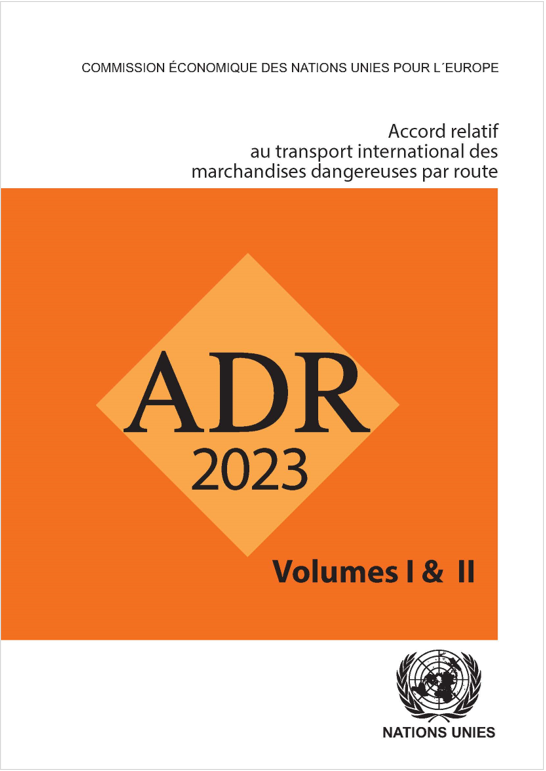ADR 2023 / Tutti i file e gli emendamenti ADR (Testo ufficiale EN/FR)
| Appunti Merci Pericolose | ||
| 10 Luglio 2025 | ||
| Salve Visitatore | ||
ADR 2023 / Tutti i File e gli emendamenti ADR (EN/FR) ID 18548 | 03.01.2023 / In allegato Disponibile il testo completo PDF dell'ADR 2023 applicabile dal 1° gennaio 2023 (EN/(FR) e la track version con i cambiamenti dall'ADR 2021 (EN). Accordo relativo al trasporto internazionale di merci pericolose su strada ADR applicabile dal 1° gennaio 2023. Visualizza e scarica il testo completo dell'ADR applicabile a partire dal 1° gennaio 2023 (i file PDF contengono segnalibri per sfogliare le diverse parti e capitoli): ADR 2023 Volume 1 English Corrigenda Corrigendum 1 (applies to the French version) Track version with changes in visible mode (new, modified and deleted text comparing to ADR 2021): Track version Volume 1 English General The European Agreement concerning the International Carriage of Dangerous Goods by Road (ADR) was done at Geneva on 30 September 1957 under the auspices of the United Nations Economic Commission for Europe, and it entered into force on 29 January 1968. The Agreement itself was amended by the Protocol amending article 14 (3) done at New York on 21 August 1975, which entered into force on 19 April 1985. The title of the Agreement was modified by the Protocol amending the title of the ADR adopted by the Conference of the Parties to the Agreement on 13 May 2019 and entering into force on 1 January 2021. As from this date the European Agreement concerning the International Carriage of Dangerous Goods by Road (ADR) will become the Agreement concerning the International Carriage of Dangerous Goods by Road (ADR). According to article 2 of the Agreement, dangerous goods barred from carriage by Annex A shall not be accepted for international transport, while international transport of other dangerous goods shall be authorized subject to compliance with: Structure of Annexes A and B The Working Party on the Transport of Dangerous Goods (WP.15) of the Economic Commission for Europe’s Committee on Inland Transport decided, at its fifty-first session (26 30 October 1992), to restructure Annexes A and B, on the basis of a proposal by the International Road Transport Union (TRANS/WP.15/124, paras. 100-108). The main objectives were to make the requirements more accessible and more user-friendly so that they could be applied more easily not only to international road transport operations under ADR, but also to domestic traffic in all European States through national or European Community legislation, and ultimately to ensure a consistent regulatory framework at European level. It was also considered necessary to identify more clearly the duties of the various participants in the transport chain, to group more systematically the requirements concerning these various participants, and to differentiate the legal requirements of ADR from the European or international standards that could be applied to meet such requirements. Part 1, which contains general provisions and definitions, is an essential part, since it contains all definitions for terms used throughout the other parts, and it defines precisely the scope and applicability of ADR, including the possibility of exemptions, as well as the applicability of other regulations. It also contains provisions concerning training, derogations and transitional measures, the respective safety obligations of the various participants in a chain of transport of dangerous goods, control measures, safety advisers, restrictions for the passage of vehicles carrying dangerous goods through road tunnels and transport of dangerous goods security. Applicable texts This version ("2023 ADR") takes into account all new amendments adopted by WP.15 in 2020, 2021 and 2022, circulated under the symbols ECE/TRANS/WP.15/256 and -/Corr.1 and ECE/TRANS/WP.15/256/Add.1, which, subject to acceptance by the Contracting Parties in accordance with article 14 (3) of the Agreement, should enter into force on 1 January 2023. Territorial applicability ADR is an Agreement between States, and there is no overall enforcing authority. In practice, highway checks are carried out by Contracting Parties, and non-compliance may then result in legal action by national authorities against offenders in accordance with their domestic legislation. ADR itself does not prescribe any penalties. At the time of publishing, the Contracting Parties are Albania, Andorra, Austria, Azerbaijan, Belarus, Belgium, Bosnia and Herzegovina, Bulgaria, Croatia, Cyprus, Czechia, Denmark, Estonia, Finland, France, Georgia, Germany, Greece, Hungary, Iceland, Ireland, Italy, Kazakhstan, Latvia, Liechtenstein, Lithuania, Luxembourg, Malta, Montenegro, Morocco, Netherlands, Nigeria, North Macedonia, Norway, Poland, Portugal, Republic of Moldova, Romania, Russian Federation, San Marino, Serbia, Slovakia, Slovenia, Spain, Sweden, Switzerland, Tajikistan, Tunisia, Turkey, Ukraine, United Kingdom and Uzbekistan. ADR applies to transport operations performed on the territory of at least two of the above-mentioned Contracting Parties. In addition, it should be noted that, in the interest of uniformity and free trading across the European Union (EU), Annexes A and B of ADR have also been adopted by EU Member States as the basis for regulation of the carriage of dangerous goods by road within and between their territories (Directive 2008/68/EC of the European Parliament and of the Council of 24 September 2008 on the inland transport of dangerous goods, as amended). A number of non-EU countries have also adopted Annexes A and B of ADR as the basis for their national legislation. Formato: pdf Collegati |
||
 |
||
|
è un sito di INVIO NEWSLETTTER Se vuoi cancellarti dall'invio della newsletter oppure effettua il login al sito ed entra nella Tua Area Riservata, in “Modifica dati” agisci con la spunta sul box di selezione “Newsletter”. L'elenco completo di tutte le ns newsletter è qui: Archivio newletter |
||
  |
||
| Certifico Srl 2000-2025 | VAT IT02442650541 | ||


































